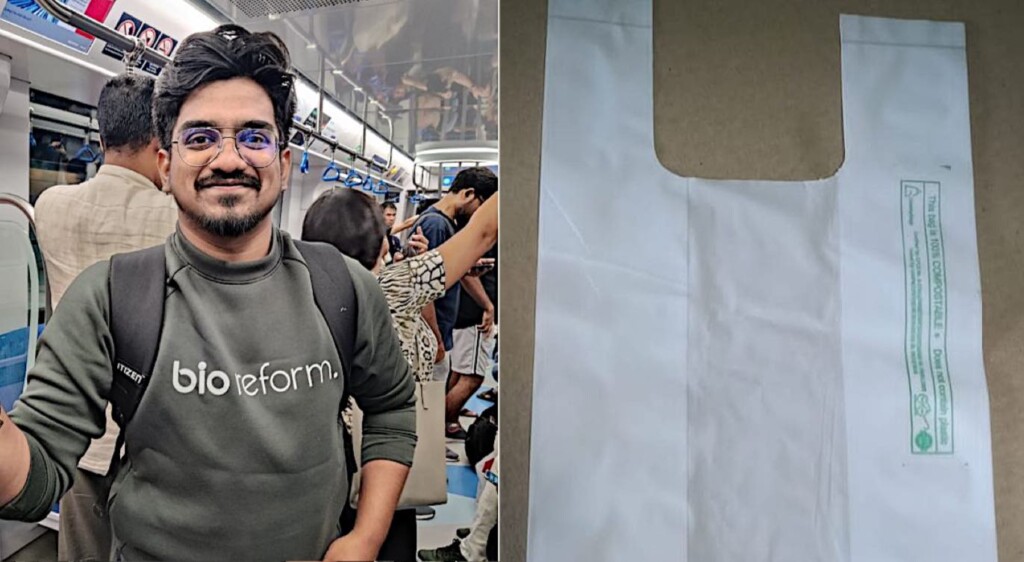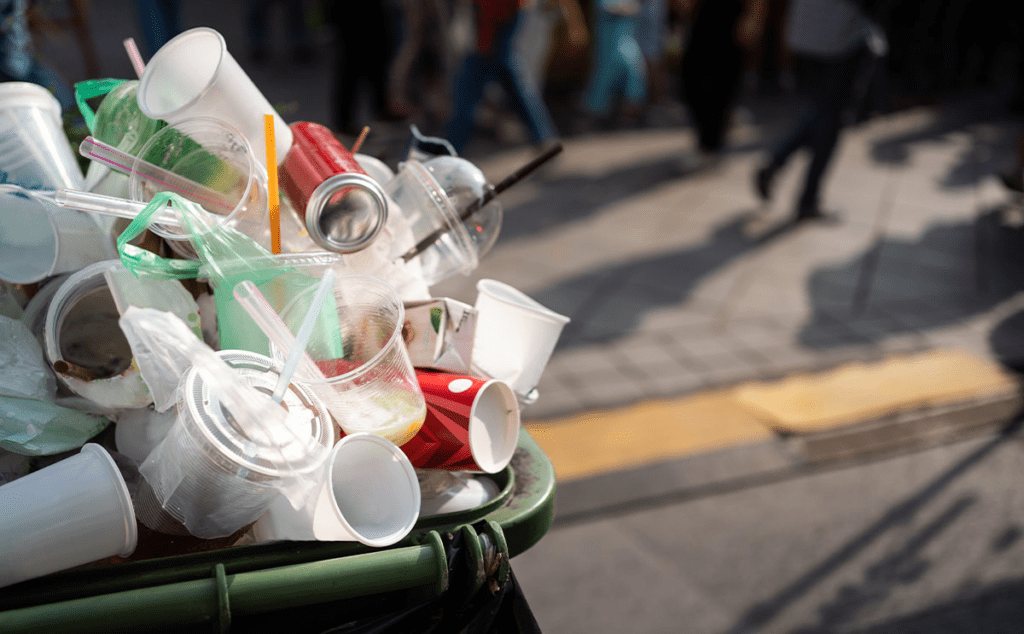In a world increasingly aware of its ecological footprint, an Indian entrepreneur is leading the charge in sustainable innovation. Mohammed Azhar Mohiuddin, founder of Bio Reform, has developed a plastic-like carrier bag made from corn waste, sugar, and cellulose. This eco-friendly alternative not only mimics the utility of conventional plastic bags but also decomposes within 180 days, offering a promising solution to the global plastic pollution crisis.
A Vision Born from Crisis
Mohiuddin, based in Hyderabad, was inspired to address the environmental impact of plastic during the global upheaval of the COVID-19 pandemic. Confronted by the sheer volume of plastic waste, he set out to find a sustainable alternative to one of the most pervasive plastic products—shopping bags. While major brands could afford biodegradable options like paper or jute, small and medium-sized businesses in India found the costs prohibitive, perpetuating the reliance on conventional plastics.
Bio Reform’s breakthrough came with the development of bags made from PBAT (Polybutylene Adipate-co-Terephthalate), a biodegradable polymer first researched in the 1980s using corn and potatoes. Despite facing significant challenges, including navigating scams and government restrictions, Mohiuddin secured nearly $100,000 in seed funding, which enabled him to scale up production.

The Environmental Impact of Bio Reform
Since its inception, Bio Reform has replaced six million plastic bags across India, significantly reducing the country’s contribution to plastic pollution. The bags are designed to decompose within 180 days, unlike traditional plastic bags that can persist in the environment for hundreds of years. This innovation not only helps to reduce the presence of microplastics in the environment but also mitigates the impact on wildlife and ecosystems.
Moreover, by utilizing agricultural waste products like corn fibers, Bio Reform contributes to a circular economy, where waste materials are repurposed rather than discarded. This approach reduces the need for virgin materials, further decreasing the environmental impact of production.
Economic and Social Considerations
Bio Reform’s model also highlights the potential for sustainable businesses to thrive economically. Despite early financial struggles, the company now produces nearly 500,000 bags annually, generating a gross revenue of $180,000. This success demonstrates that eco-friendly alternatives can be economically viable, even in markets where cost is a critical factor.
Mohiuddin’s journey underscores the importance of innovation in addressing environmental challenges. His work not only provides a practical solution to plastic pollution but also sets a precedent for other entrepreneurs looking to create sustainable products.
The Path Forward: Actions for Sustainability

While Bio Reform’s achievements are commendable, much more needs to be done to tackle the global plastic crisis. Here are some actions that individuals, businesses, and governments can take:
- Support Sustainable Products: Choose biodegradable or compostable alternatives whenever possible. By supporting companies like Bio Reform, consumers can help drive demand for sustainable products.
- Implement Circular Economy Practices: Businesses should explore ways to incorporate waste materials into their production processes, reducing reliance on non-renewable resources.
- Policy and Regulation: Governments can play a crucial role by implementing regulations that encourage the use of biodegradable materials and penalize excessive plastic waste.
- Education and Awareness: Increasing public awareness about the environmental impact of plastic and the benefits of alternatives is essential for driving behavioral change.
- Invest in Research and Development: Continued innovation is key to finding new solutions to environmental challenges. Investment in research can help bring more sustainable products to market.
Conclusion
Bio Reform’s success is a testament to the power of innovation in the fight against plastic pollution. As the world grapples with the ecological challenges posed by plastic waste, it is crucial to support and expand upon such sustainable initiatives. By taking collective action, we can move towards a future where eco-friendly products are the norm, not the exception.
The journey of Bio Reform illustrates the potential for business models that prioritize sustainability without compromising on quality or practicality. Their approach demonstrates that it is possible to create products that meet consumer needs while significantly reducing environmental impact. This success story serves as an inspiration for other entrepreneurs and established companies to invest in research and development of sustainable alternatives across various industries.
However, the transition to a plastic-free future requires more than just innovative products. It demands a shift in consumer behavior, corporate responsibility, and government policies. Consumers play a crucial role by making conscious choices and supporting brands that prioritize sustainability. Their purchasing decisions send powerful signals to the market, encouraging more companies to adopt eco-friendly practices.
Corporations, on the other hand, need to reassess their production processes and supply chains. By integrating sustainability into their core business strategies, companies can not only reduce their environmental footprint but also tap into the growing market for green products. This shift can drive further innovation and create a virtuous cycle of sustainable development.
Governments and policymakers have a vital role in creating an enabling environment for sustainable initiatives to thrive. This can include implementing regulations that discourage single-use plastics, providing incentives for eco-friendly alternatives, and investing in infrastructure for better waste management and recycling. International cooperation is also crucial in addressing the global nature of plastic pollution, particularly in our oceans.
Educational institutions and NGOs can contribute by raising awareness about the impacts of plastic pollution and promoting sustainable lifestyles. By integrating environmental education into curricula and community programs, we can cultivate a generation that is more conscious of its ecological footprint and equipped to drive positive change.
The media, too, has a significant role in shaping public opinion and highlighting success stories like Bio Reform. By giving visibility to sustainable innovations and their impacts, media can help accelerate the adoption of eco-friendly alternatives and inspire further innovation in the field.
Looking ahead, the success of Bio Reform and similar initiatives points to a future where sustainability and profitability go hand in hand. As more consumers, businesses, and governments recognize the urgency of addressing plastic pollution, we can expect to see an acceleration in the development and adoption of sustainable solutions.
In conclusion, while the challenge of plastic pollution is daunting, stories like Bio Reform’s give us reason for optimism. They show that with creativity, determination, and collective effort, we can create meaningful change. As we move forward, it is imperative that we continue to support and scale up such initiatives, fostering a global movement towards sustainability. By doing so, we can work towards a future where our reliance on harmful plastics is dramatically reduced, and our ecosystems can thrive once again. The path to this future requires commitment and collaboration from all sectors of society, but the potential rewards – a cleaner planet and a more sustainable way of life – make it a journey worth undertaking.
Related Content
- Solid shampoo and conditioner bars: Ditch plastic bottles and opt for zero-waste shampoo and conditioner bars.
- Breakthrough in Bioplastics: Barley and Sugar Beet Offer Hope for a Plastic-Free Future
- Safer Fertilizers from Wastewater Sludge
- Researchers invent 100% biodegradable ‘barley plastic’
- 15 Earth-Friendly, Plastic-Free Products for a Sustainable Home
- Unlocking the Potential: West Africa’s Journey to Sustainable Plastic Management
- Startup Uses Corn Waste to Make Bags That Decompose in 180 Days
- 24YO Creates Compostable Bags from Agriwaste, Earns ₹1.3 Cr in Revenue
- Innovative Startup Transforms Corn Waste into Biodegradable Bags, Eliminating 6 Million Plastic Bags | LivaRava Finance
- Beyond Plastics: The Rise of Innovative Alternatives to Tackle Packaging Waste | KrASIA
- Alternative packaging materials – Climate Action Accelerator

